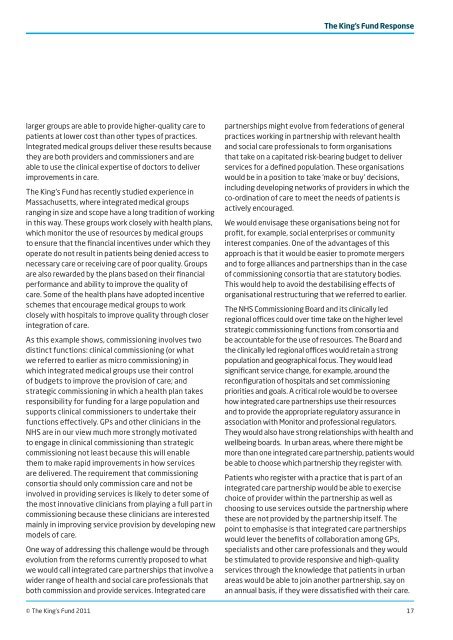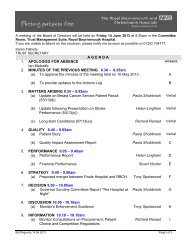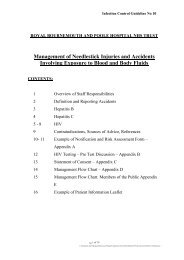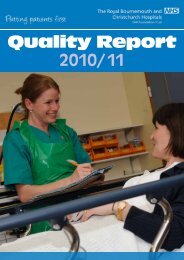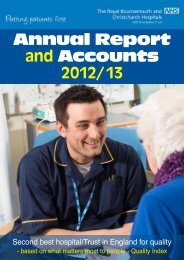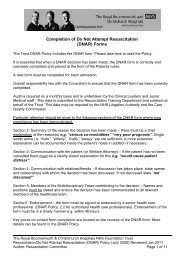View June's Board Pack - Royal Bournemouth Hospital
View June's Board Pack - Royal Bournemouth Hospital
View June's Board Pack - Royal Bournemouth Hospital
- No tags were found...
You also want an ePaper? Increase the reach of your titles
YUMPU automatically turns print PDFs into web optimized ePapers that Google loves.
The King’s Fund Responselarger groups are able to provide higher-quality care topatients at lower cost than other types of practices.Integrated medical groups deliver these results becausethey are both providers and commissioners and areable to use the clinical expertise of doctors to deliverimprovements in care.The King’s Fund has recently studied experience inMassachusetts, where integrated medical groupsranging in size and scope have a long tradition of workingin this way. These groups work closely with health plans,which monitor the use of resources by medical groupsto ensure that the financial incentives under which theyoperate do not result in patients being denied access tonecessary care or receiving care of poor quality. Groupsare also rewarded by the plans based on their financialperformance and ability to improve the quality ofcare. Some of the health plans have adopted incentiveschemes that encourage medical groups to workclosely with hospitals to improve quality through closerintegration of care.As this example shows, commissioning involves twodistinct functions: clinical commissioning (or whatwe referred to earlier as micro commissioning) inwhich integrated medical groups use their controlof budgets to improve the provision of care; andstrategic commissioning in which a health plan takesresponsibility for funding for a large population andsupports clinical commissioners to undertake theirfunctions effectively. GPs and other clinicians in theNHS are in our view much more strongly motivatedto engage in clinical commissioning than strategiccommissioning not least because this will enablethem to make rapid improvements in how servicesare delivered. The requirement that commissioningconsortia should only commission care and not beinvolved in providing services is likely to deter some ofthe most innovative clinicians from playing a full part incommissioning because these clinicians are interestedmainly in improving service provision by developing newmodels of care.One way of addressing this challenge would be throughevolution from the reforms currently proposed to whatwe would call integrated care partnerships that involve awider range of health and social care professionals thatboth commission and provide services. Integrated carepartnerships might evolve from federations of generalpractices working in partnership with relevant healthand social care professionals to form organisationsthat take on a capitated risk-bearing budget to deliverservices for a defined population. These organisationswould be in a position to take ‘make or buy’ decisions,including developing networks of providers in which theco-ordination of care to meet the needs of patients isactively encouraged.We would envisage these organisations being not forprofit, for example, social enterprises or communityinterest companies. One of the advantages of thisapproach is that it would be easier to promote mergersand to forge alliances and partnerships than in the caseof commissioning consortia that are statutory bodies.This would help to avoid the destabilising effects oforganisational restructuring that we referred to earlier.The NHS Commissioning <strong>Board</strong> and its clinically ledregional offices could over time take on the higher levelstrategic commissioning functions from consortia andbe accountable for the use of resources. The <strong>Board</strong> andthe clinically led regional offices would retain a strongpopulation and geographical focus. They would leadsignificant service change, for example, around thereconfiguration of hospitals and set commissioningpriorities and goals. A critical role would be to overseehow integrated care partnerships use their resourcesand to provide the appropriate regulatory assurance inassociation with Monitor and professional regulators.They would also have strong relationships with health andwellbeing boards. In urban areas, where there might bemore than one integrated care partnership, patients wouldbe able to choose which partnership they register with.Patients who register with a practice that is part of anintegrated care partnership would be able to exercisechoice of provider within the partnership as well aschoosing to use services outside the partnership wherethese are not provided by the partnership itself. Thepoint to emphasise is that integrated care partnershipswould lever the benefits of collaboration among GPs,specialists and other care professionals and they wouldbe stimulated to provide responsive and high-qualityservices through the knowledge that patients in urbanareas would be able to join another partnership, say onan annual basis, if they were dissatisfied with their care.© The King’s Fund 2011 17


